Zeina Daccache is a trailblazer in the world of art therapy, a filmmaker and a staunch advocate for social change. Best known for her innovative work in using drama and the arts as tools for healing and empowerment, she has transformed countless lives, bringing attention to marginalized voices and societal issues. From the walls of prisons, her groundbreaking projects reveal the power of creativity in fostering resilience and connection. In this interview, Daccache takes us on a journey through her inspiring career, sharing insights into her unique approach to art, the profound impact of her work and her upcoming play.
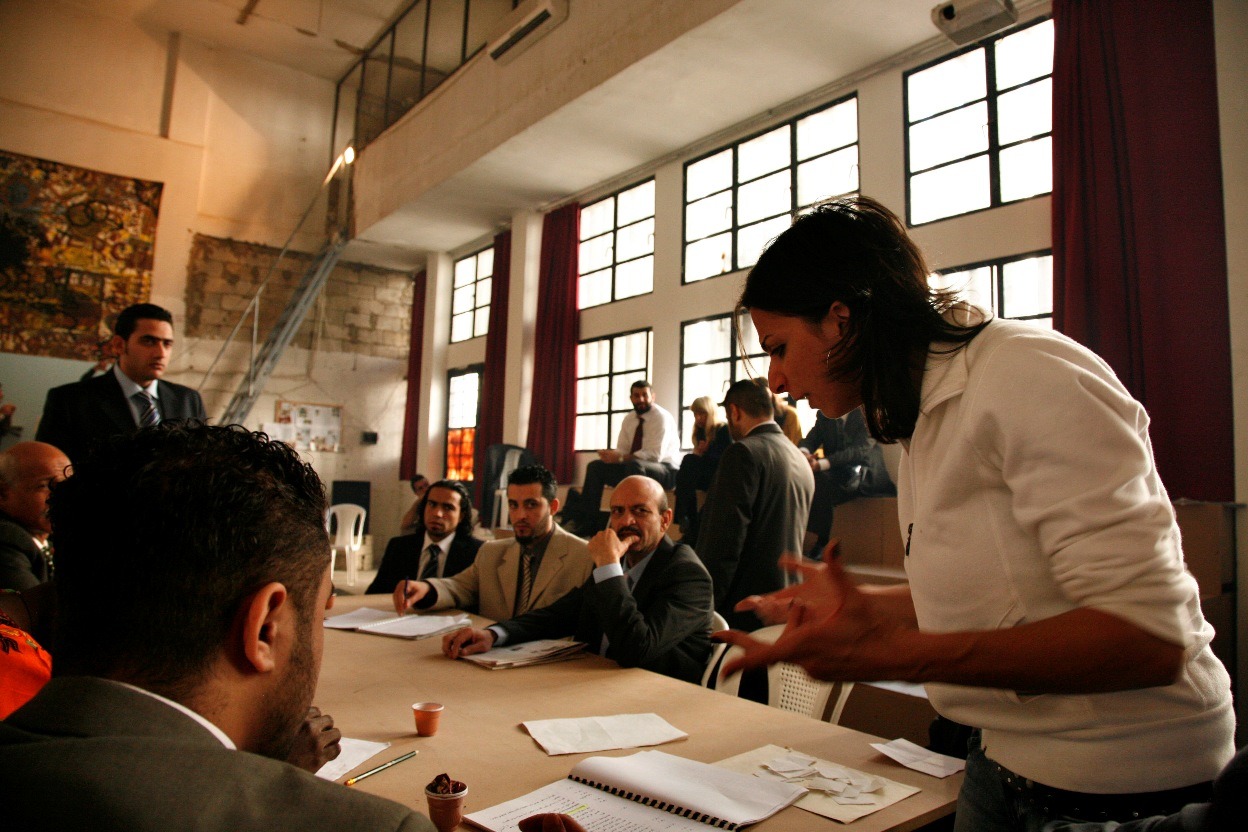
Credit: Dalia Khamissi / Catharsis-LCDT
How would you describe your journey?
My journey in drama therapy, filmmaking and theater production began as far back as I can remember. I initially studied theater, but my passion for understanding the human psyche led me to pursue a master’s degree in clinical psychology.
From the very beginning, I believed in the profound synergy between theater and psychology, long before I discovered the existence of drama therapy as a specialized field. When I learned about this unique discipline — using theater as a therapeutic tool — I knew I had found my true calling.
This realization took me to the United States, where I honed my skills and returned with one ambitious goal: to introduce drama therapy in Lebanese prisons. In 2006, I stepped into a prison for the first time, planning a short-term project that was meant to last no more than two or three years. Instead, it became a transformative 13-year journey.
Every day, I worked closely with inmates, facilitating drama therapy sessions that culminated in powerful plays performed within the prison walls. Over time, I extended this work to Baabda prison for women. The plays opened the gates of these institutions to the outside world, allowing society to witness the transformative power of art and storytelling.
These performances were more than just therapeutic for the inmates; they also served as a mirror for society, sparking dialogue and inspiring change. Many of my productions carried vital messages for the public and decision-makers alike, which contributed to the amendment of several laws affecting the lives of inmates in Lebanon.
This journey has been one of resilience, creativity and advocacy, all driven by the belief that theater can heal, empower and transform individuals and communities alike.
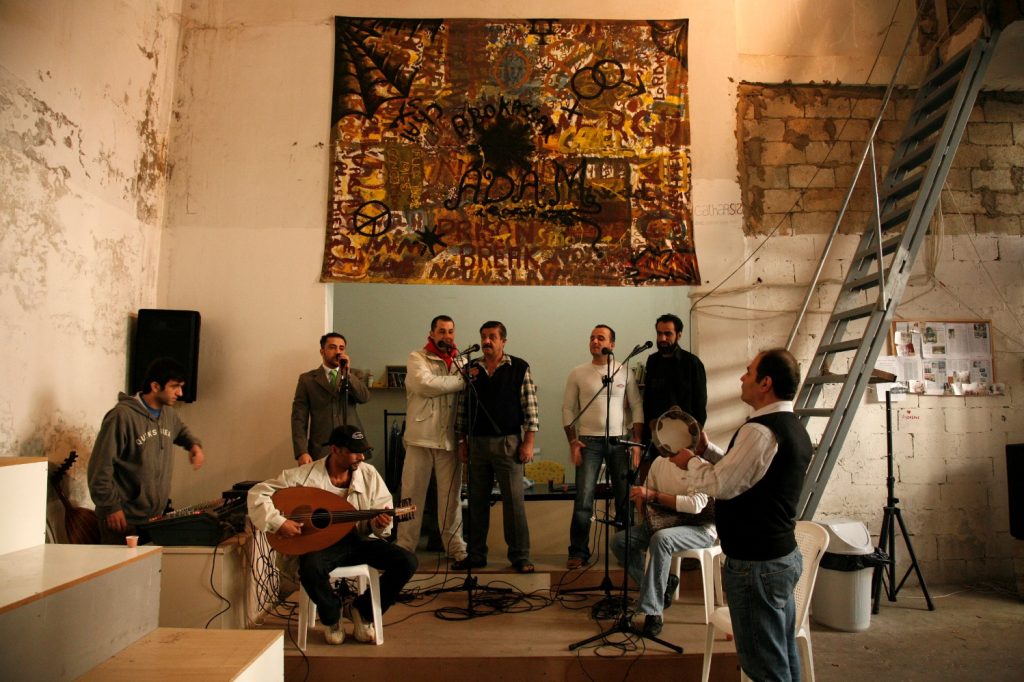
Credit: Dalia Khamissi / Catharsis-LCDT
What was the greatest challenge you faced during the 13 years you spent working with prisoners?
The greatest challenge I faced wasn’t inside the prisons with the male inmates — it was getting there in the first place. Before stepping through those gates, I encountered endless skepticism. Decision-makers questioned me relentlessly: “Aren’t you afraid? You’re a woman, and you want to go inside there?” Their hesitation was palpable, and their doubts were rooted in outdated stereotypes.
Gaining access required navigating a labyrinth of bureaucracy. Securing six clearances — from the chief of the gendarmerie to the ministers of justice and interior — meant appealing to a deeply patriarchal system. I was 27 at the time, presenting a bold idea to men who held all the authority. I understood their resistance; to them, I was a young woman asking to enter what they saw as a dangerous, male-dominated world. It took a year and a half of persistence to finally break through.
But once I entered the prison, everything changed. The inmates didn’t see me as a “girl” or question my presence. I wasn’t there as a woman — I was there as a human being, as a therapist and as someone who genuinely wanted to connect. My attitude set the tone, and they quickly understood my purpose.
In fact, their response was far more welcoming than that of the authorities. Over time, I earned their trust to the extent that they started calling me “Abu Ali,” a name that symbolized leadership and respect. It was a profound moment when the barriers of gender dissolved, and they saw me not for what I was, but for what I was doing.
The real challenge lay in overcoming the system’s lack of empathy and breaking through the rigid structures that governed access. Yet, those initial hurdles were worth it because, once inside, the transformative work could begin.
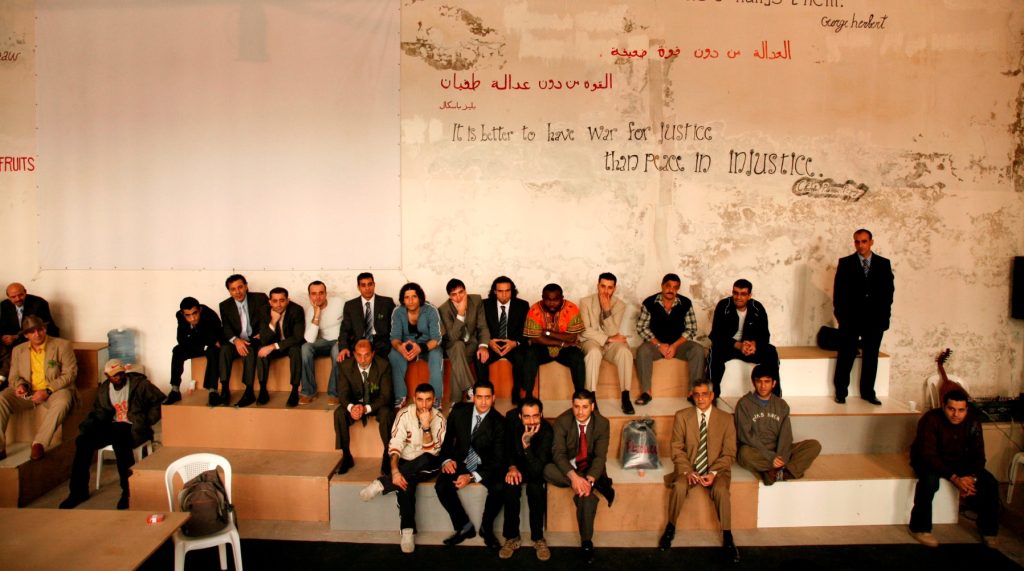
Credit: Dalia Khamissi / Catharsis-LCDT
What can you tell us about your upcoming play, “Li Chabakna Ykhalessna”?
I have found myself back on stage, maintaining a connection to the world of prisons, though I haven’t set foot inside one in a few years. This connection comes to life in my latest play, “Li Chabakna Ykhalessna.” It’s a unique production where I share the stage with Joseph, an ex-inmate who spent 30 years in prison for murder. Together, we present ourselves as Zeina Daccache and Joseph, blending our real-life experiences into a deeply personal narrative.
The texts we’ve written are drawn from our shared journey, offering a raw and authentic perspective. The play is a tragicomedy—a blend of satire, tragedy, and humor that invites the audience to laugh while reflecting on profound realities.
Joining us is Sam Ghazal, a 24-year-old stand-up comedian who brings a fresh, youthful energy and perspective to the performance. Together, we aim to create a piece that is both entertaining and thought provoking, a true reflection of life’s complexity.
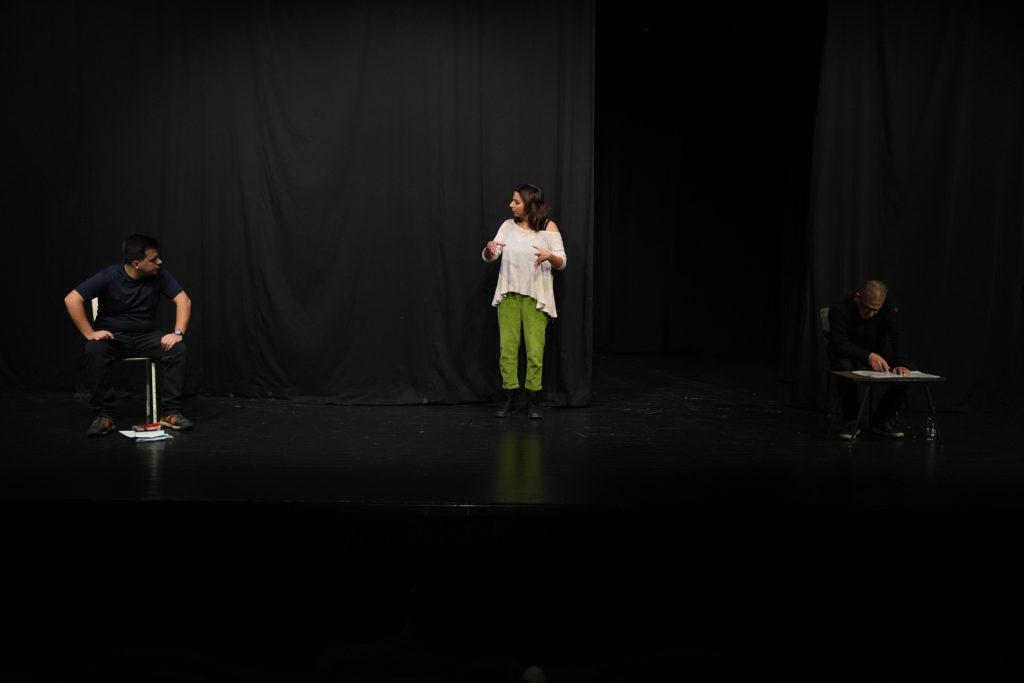
Credit: Ahmad Terro / Catharsis-LCDT
Do you view theater as a tool for advocacy?
Absolutely. The relationship I’ve built through my work, from inside the prison walls to the outside world, is truly one of a kind. My last prison-based play was in 2015, but as I return to the stage in 2025, I realize I can’t create a play without involving someone I’ve worked closely with during those transformative years.
For me, theater is not about casting actors or recreating Shakespeare — though I respect his brilliance. I’m not drawn to traditional storytelling. Instead, I seek out real, lived experiences. Joseph, who was part of my earlier project 12 Angry Lebanese, helped lobby for the implementation of a long-ignored parole law in Lebanon. That law ultimately secured his release, making him a living testament to the change we can achieve.
This play, “Li Chabakna Ykhalessna,” is more personal than activist. It reflects my journey and the unique bond Joseph and I share. In one of the scenes, the roles are reversed — Joseph becomes the therapist, and I’m the client. It’s a delicate exploration of healing and humanity, blending comedy, tragedy and reflection.
Theater has always been my tool for advocacy, from lobbying for parole laws to addressing domestic violence laws through performances in Baabda prison. Yet this new work steps away from activism to focus on expression, storytelling and connection.
Looking forward, I dream of tackling systemic issues in Lebanon, especially those rooted in patriarchal systems. For instance, I aspire to work on a law granting Lebanese mothers the right to pass their nationality to their children. Drama therapy has taught me that healing begins when we move beyond words, offering creative tools to express, understand, and rebuild. It’s not just about talking — it’s about transforming.
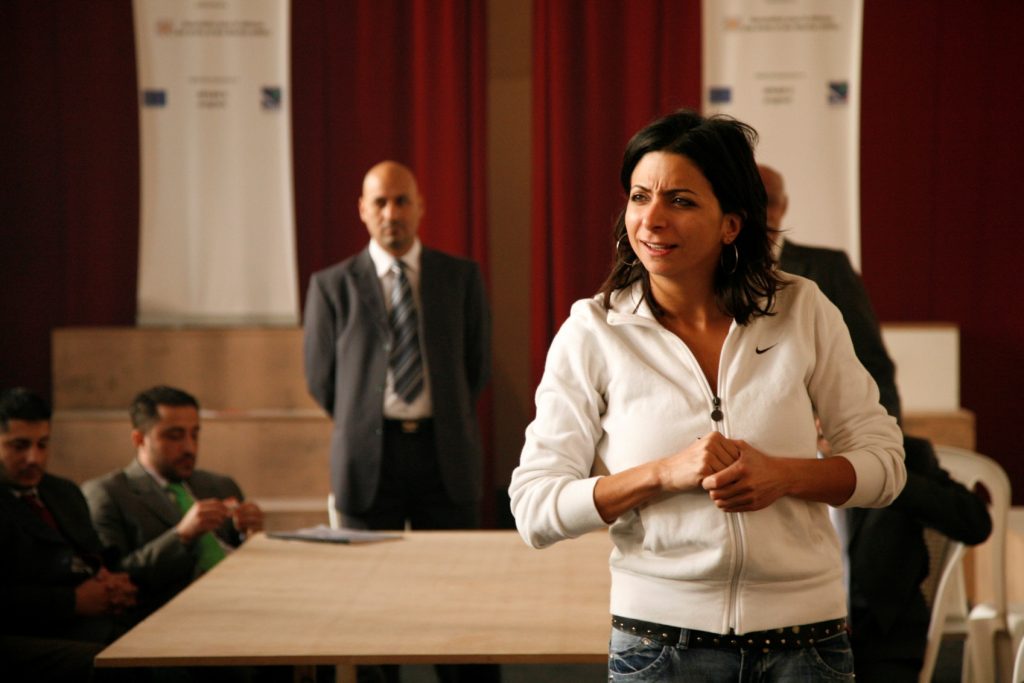
Credit: Dalia Khamissi / Catharsis-LCDT
How rooted are you in Lebanon?
I love Lebanon — deeply, unapologetically and with all its contradictions. This love is something I explore openly in my latest play, where art mirrors life. I’m married to a Jordanian, and in the play, I find myself questioning how did I, someone so deeply rooted in Lebanon, end up marrying someone from elsewhere?
There’s a scene where I ask Joseph, “Can you believe it? Me, the one who loves Lebanon so much, married to a Jordanian?” It’s a moment of reflection, filled with humor and self-awareness. My husband, having never lived through war, often offers a fresh perspective that clashes with my ingrained resilience. During tense times, he’d suggest moving to Jordan for safety, while I’d stubbornly resist, saying, “If we die, we die.”
This contrast highlights something profound: the deep connection many of us feel to Lebanon, even in the face of challenges like war, no electricity, and instability. My husband often looks at us with disbelief, asking, “Are you okay? Why do you stay?”
In the play, and in my life, I grapple with the question of why I love Lebanon so much — I don’t yet have an answer. All I know is that this love persists, rooted in something bigger than logic, something tied to our history, culture and even our shared traumas. For now, the search for answers continues, but the love remains unwavering.
Where do you go to disconnect?
The sea is my sanctuary. There’s no specific spot I need — anywhere I can see the waves and park my car is enough. Living in Byblos is a blessing because the sea is always within reach. My balcony opens up to a view of endless blue, a daily reminder of how fortunate I am.
Whenever I visit Beirut, where cement and concrete dominate the skyline, I feel stifled. The absence of the sea, replaced by walls of gray, feels suffocating. The beauty of our coastline and the warmth of our weather are treasures I deeply cherish. You don’t realize how much waking up to sunlight affects your mood and outlook until it’s gone.
I remember studying in London for two years. I admire the city for what it taught me, but I was deeply unhappy there. Navigating the underground, hearing “mind the gap” every day, felt like a constant reminder of what I missed — light, openness and connection to nature. I’d think to myself, “Stop telling me to mind anything—just show me the sun!”
The sea and the sun aren’t just luxuries to me — they’re lifelines, grounding my spirit and shaping the way I see the world.
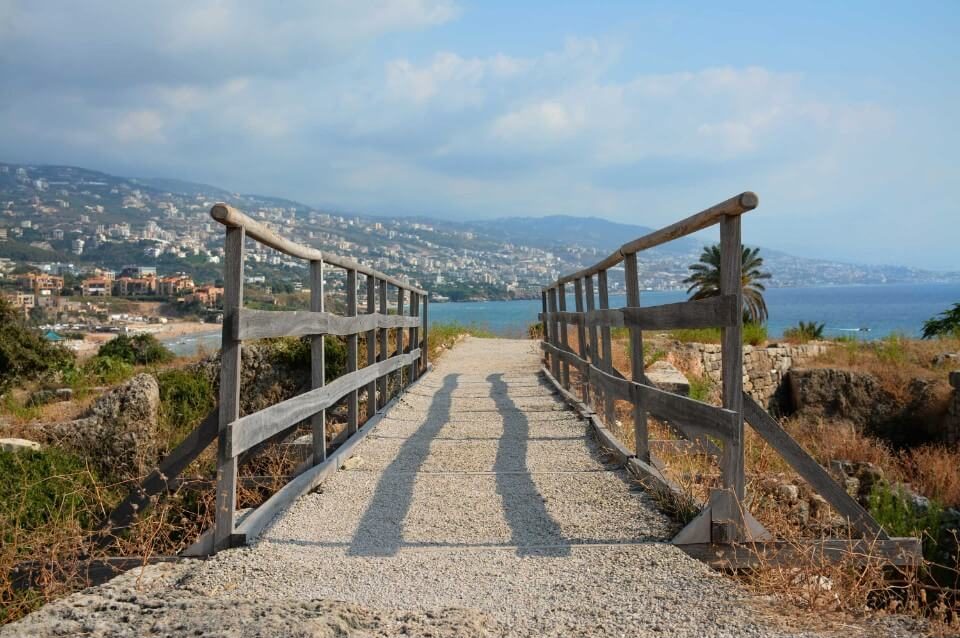
Credit: Nabeel Yakzan
Given your ties to Byblos, what is your top tip for visitors seeking a hidden treasure in the area?
Byblos is full of treasures, but there’s one hidden gem that feels truly special. Just a short drive from the coast — about seven minutes uphill — you’ll find yourself in a serene area called Blat. Perched on a hill is a charming coffee shop called Haven the Cabin.
It’s a peaceful spot with a breathtaking view that stretches from Batroun to Beirut. Sitting there with a cup of coffee, surrounded by the beauty of nature, offers a tranquility that’s hard to match. Located near the LAU campus, it’s a retreat where you can unwind and soak in the magic of Lebanon’s landscapes. If you’re ever in Byblos, this is a place you won’t want to miss.
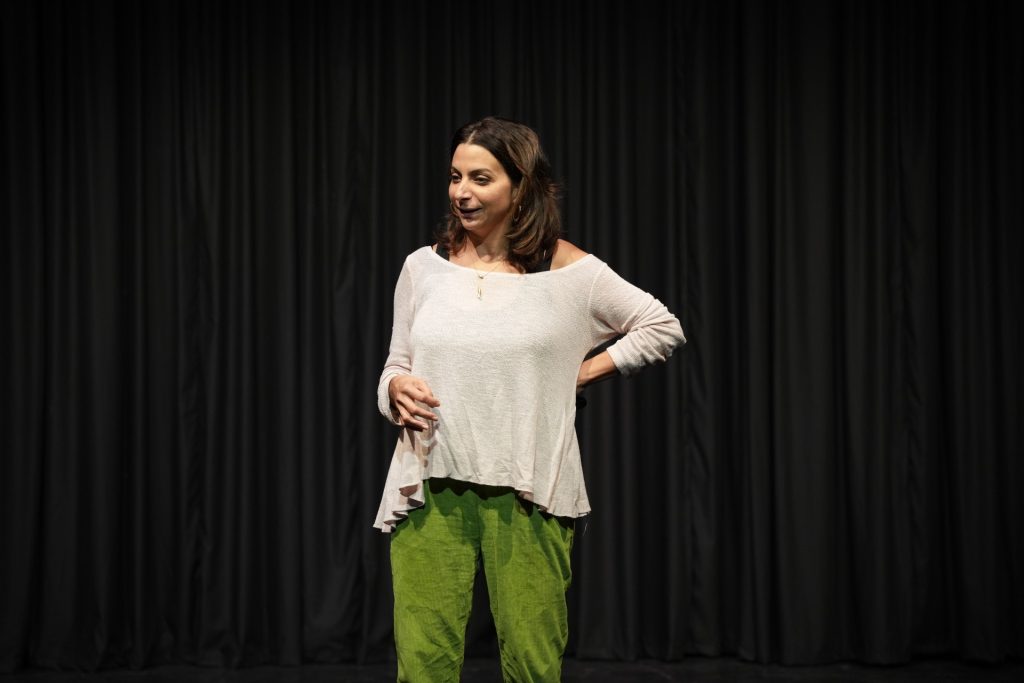
Credit: Ahmad Terro / Catharsis-LCDT
Besides your upcoming play, what’s next for Zeina Daccache?
Last year, I wrote a film alongside four ex-inmates. Together, we crafted a script that delves into the reality of prisons in Lebanon. While I can’t share too many details just yet, I’m hopeful that it will soon be picked up by one of the major platforms. It’s a project born from lived experience, and I’m excited for it to reach a wider audience, shedding light on a powerful and important subject.
“Li Chabakna Ykhalessna” runs from 7-23 February 2025 at Le Monnot Theater, Achrafieh. For tickets, visit Antoine Ticketing.
If you enjoyed reading this, check out our interview with John Saad.
Loading
